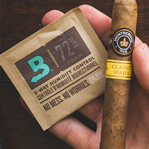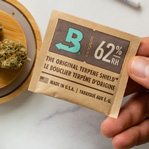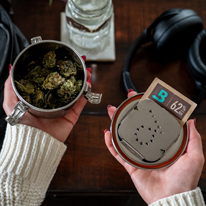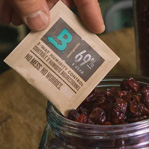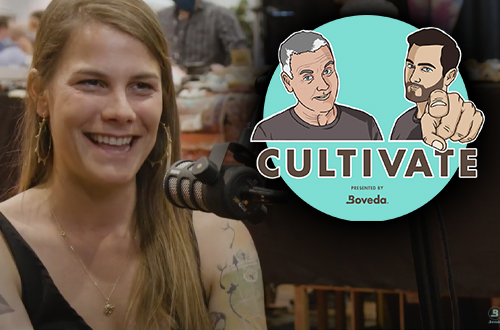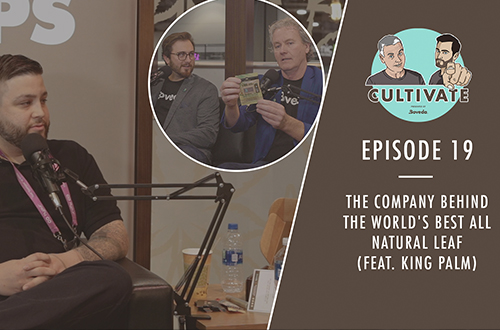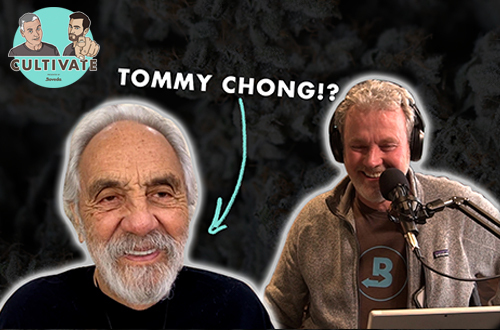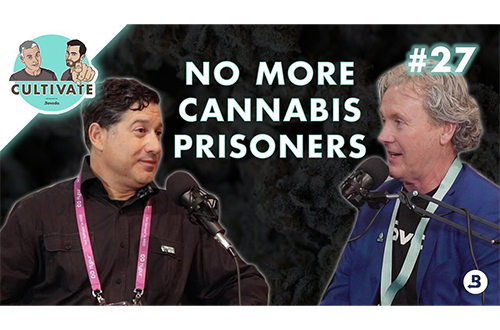Read Full Interview: Video Transcript
Mark Ross (MR): So the idea is to bring people out of the jails. The mission of the organization is we will not rest until the last cannabis prisoner is set free. And then beyond that, we need to train these folks to come into the legal market so they don’t return to the illicit market.
Voice Over: Welcome to another episode of Cultivate. This is a show about you and your journey in the cannabis industry. It’s moving fast, but there’s room for everyone. Buckle up as we bring you the people and the technology that are blazing the trail.
Drew Emmer (DE): You are tuned into Cultivate, a podcast brought to you by Boveda. We’re dedicated to bringing you the people and the technology that are blazing a trail in the cannabis industry. I’m Drew.
Scott Swail (SS): This is Scott. We got Mark Ross. You’ve gotten better at these intros. You don’t have to look at the paper any more.
DE: I’m getting used to it. I don’t stare at the floor either. So Mark Ross is with us. It’s always wonderful when we discover in the cannabis industry companies and individuals and leadership that are taking the bull by the horns and putting their money where their mouth is and making a difference. The Last Prisoner Project is a… We did an interview with Andrew DeAngelo at a previous show and we got the lowdown from him about Last Prisoner Project. We’d love to know more about that. We’ve got Mark Ross with us from Harvest. Harvest is a partner with Last Prisoner Project. Mark, can you give us the thumbnail about what the cause is and what they’re actually doing?
MR: Sure. Last Prisoner Project was the brainchild of Steve DeAngelo and Andrew DeAngelo, obviously legends in the industry. They have felt very strongly for some time that we have in this country alone 40,000 people sitting in U.S. jails, many in States where we have legalized cannabis. Most of those people do not look like the three of us. They are people of color that have been discriminated against. Even after they get out of jail, they have these convictions. So they can’t get housing. They can’t get education. They can’t get jobs. And they can’t work in the cannabis industry in most States. So we can’t even hire these folks. True fact, about 70, 65 to 70%, there’s a recidivism rate if you’ve been in prison after seven years, 65 to 70% will be back in jail.
So the idea is to bring people out of the jails. The mission of the organization is we will not rest until the last cannabis prisoner is set free. And then beyond that, we need to train these folks to come into the legal market so they don’t return to the illicit market. That’s what I work on at Harvest. We’re building the Prison Reentry Program and Training Program for that project.
Helping Cannabis Inmates After Release
SS: So then would you take those folks that are getting out, going through that training and then they have the opportunity to apply or work at Harvest? Is that kind of the…
MR: Yeah, it’s that. It’s a 16-week course where we teach computer skills, communication skills, life skills and, of course, cannabis skills. So everything from anger management to time management from financial literacy to Microsoft Excel to, of course, cannabis skills. So Cannabis 101, How to Work in Retail, Point of Sale, Seed to Sale, Compliance, Law, Manufacturing, Cultivation, Supply Chain, you name it, it’s a whole suite. At the end of the 16 weeks they’ll get a certificate. And we will, of course, want to create a funnel of talent for our retail operations, our manufacturing, our cultivation, but we’re not going to be able to hire everyone. We’re going to be basically preparing a workforce for the cannabis industry. And in States that have expungement and clemency if we can hire these folks, we will do so.
In States where we don’t, we will have a stack of graduation certificates and we will go to legislators and we will say, “You know what? These folks are all ready now, shovel-ready to go into the cannabis industry, but they can’t. And you need to do something about that before they return to the illicit market.”
MSOs Like Harvest Health Work Toward Restorative Justice
SS: For those of us that don’t know what Harvest is or who Harvest is, can you just give a little background just on what you guys are?
DE: That’s exactly what I was going to say. If you’re wondering, we’re connected.
MR: You guys think alike.
DE: One brain between us.
SS: Mine’s just younger and functions a little bit more efficiently.
MR: So Harvest-
SS: Sorry, that was the only insult.
MR: So Harvest is a multi-state operator. We were founded from humble beginnings by a former lawyer, Steve White in Tempe, Arizona with one small dispensary. Now, we are a multi-state operator with a presence in nine States. I think when the acquisitions that we have announced close, I think it’s 18 States and Puerto Rico. We’re fully vertically integrated. So we have manufacturing. We have cultivation. We have brands. We have retail in a number of States, mostly medical, but we have some retail operations, nonmedical, in places like California. I am the Director of Community Outreach. So I have the coolest job in the company, because I get to deploy resources, human and financial, to make sure we’re having a positive impact in every single community that we touch. Last Prisoner Project just fits right into that.
DE: Well, I think Damian would argue with you that he might have the best job as the botanist. He likes the whole plant thing. But the other thing about Harvest is they have been consistently profitable. It’s one of the unique things about Harvest’s growth story is the way that they have entered this marketplace has been different than a lot of other people that have done giant cash burns in the equity markets. I mean, you guys have really grown in a very methodical and a remarkably fast way. You guys are like no other group in the country. What I’m curious about is all the States that you operate in, is Last Prisoner Project limited to certain States, or is it all over the country?
MR: We are, in essence, deploying the resources for the Prison Reentry Program. Last Prisoner Project, the organization itself, Steve DeAngelo’s group, along with Sarah and Mary and Andrew, they’re going to decide where we deploy it, and when, and who the local partner is. We consult on that because we’ve designed the program and we need to be engaged in that process. We have targeted to launch the pilot class in northern California, in the Bay area, in Oakland, at a college that has a Prison Reentry Program already, but doesn’t focus on cannabis. So we’ll have classrooms. We’ll have computers. We’ll have computer labs. We’ll have professors that can also do some of the life skills and computer skills courses, freeing us to really hammer home on the cannabis skills.
The idea though, is once we finish that pilot class, probably around May because it’s 16 weeks, we’re going to start to deploy in other places. I would like to take it to Illinois, because they have a very aggressive expungement program. And with our acquisition of Verano, we’re going to have a pretty big footprint in the Midwest. We also have a pretty significant partner in Ohio who would like us to bring it into Ohio. We’re looking in Maryland. Florida, we have a large presence. We would like to take this, obviously, everywhere.
A lot of it will be able to be done virtually as we build the program. About half the program will already be shovel-ready virtual. Students can go on the computer and take some of the life skills and computer skills courses at their own pace. The cannabis skills courses we are going to be doing live the first couple of times.
Want to get involved with Last Prisoner Project?
DE: Can people contribute to the cause?
MR: Sure. Last Prisoner Project is a 501(c)(3) tax exempt organization, nonpolitical, nonpartisan. They are basically funding the Expungement and Clemency Program. They have everything from a large sponsor of the Clemency Program, which I think they are looking for right now. I think that is a $250,000 ask, but don’t hold me to that. I think I heard Steve say that last night at a party or two nights ago at a fundraiser. Then there’s lower levels as well. Companies can get on board, whether it’s a brand, an ancillary business, a vertically integrated company, like Harvest. We need everybody to come along. This is a problem, much like healthcare or education in this country, that no one company or one small group of companies is going to fix it. We need the entire industry behind this issue, because it is a wrong-
DE: But it’s a no-brainer emotionally, because these are nonviolent offenders whose only crime was that they had in their possession banned substance. They have served a significant period of time. There’s a movement afoot to get these people back on their feet and rehabilitated, back into society. Expungement. This is just an act of mercy. It’s an awesome thing for the industry to be focused on. I don’t remember quite what the motto is, but it’s like people that are doing time for trying to make money for things that people are doing now that are legally making money. It’s that juxtaposition of the way things used to be or the way they are now. It’s high time that people get out of the correction system.
SS: What are-
MR: I’m sorry.
SS: What are the biggest struggles that these folks are going through after the fact? So they get expunged. You help them. Are there ongoing struggles that you’re going to help support after the fact?
MR: Well, yeah, we hope that by providing such a robust course that provides these life skills and computer skills that even if they don’t go into cannabis, they become entrepreneurs. My dream for our part of this is we go into prisons. We go into San Quentin. We take people and we put them through this course. They come out of prison. They have their record expunged. We train them at Harvest. We bring them along. They have an idea. They go off on their own. Maybe we incubate them. Maybe we invest in them. They go off and make a zillion dollars. And it’s a story on 60 Minutes, really. It’s a restorative justice play.
It’s not just a feel good because it’s the right thing to do. It’s a restoring justice, a long overdue justice that we need to do. And it’s good business. It just is. It creates a diverse, very talented workforce of folks that were in the illicit market, as some are saying, the legacy market.
DE: You guys should talk to the Cash Family, the estate of Johnny Cash, because all the work that he did in prisons. It would be really cool to see if there wouldn’t be a appropriate soundtrack to go along with this Last Prisoner Project and this course that you guys are working so hard on. Terrific endeavor for you guys to be involved in. Thank you, Harvest for taking it on and spending the money and leading the way. Really awesome corporate citizenship, the passion that you guys bring to the marketplace, going beyond business and using it to help improve people’s lives. It’s an extraordinary act of leadership in the cannabis industry. It’s fantastic. Thank you.
MR: I’m in some ways blessed that the stars aligned, that this project just came onto my plate, just at the right time, as we were building our own learning and development resources for our own scaling to do our own training for our own employees when Last Prisoner Project said they didn’t have anyone doing theirs. And I knew them. I just said, “What if we plug and play all this? Add some life skills and bring in some instructors that know what they’re doing to work with the prison population.” And here you go. It’s great.
SS: That’s awesome.
DE: I bet I know what your next question is.
SS: Okay, aside from the outreach… Is this different?
DE: Oh, dude, keep going.
What’s Ahead For Harvest Health & Recreation?
SS: Okay. So aside from the outreach, what are some new things that are going on at Harvest? What are your plans for 2020? What’s the future look like?
MR: I’m glad you asked. A lot of my job, again, is to make sure we’re positively impacting communities. There are a lot more communities that are coming online for Harvest, especially with Verano and some of the other acquisitions, bringing those workers, integrating those workers into our culture and our workforce, providing volunteer opportunities for them in their own communities. Because we know from, especially on the retail side, we have a mostly millennial workforce. We know for all the studies outside of cannabis, millennials want to do something more than a job. They want to come to a company that they believe in and are given opportunities to do things other than their day job. My job is to find volunteer opportunities in alignment with our pillars.
We developed our pillars over the last six months, which are health and human services, education and social equity. So finding ways to get our employees involved in communities, finding community groups that need our help. The ones that are in the community that need the most help, whether it’s the epilepsy foundation… The entire month of October, we worked with two breast cancer awareness groups, one in Arizona and one national one, Libby’s Legacy, which is Melissa Etheridge’s new breast cancer group. We’re starting to build partnerships. We just did, in November, we did a bunch of events around veterans, so educational events with our medical director, fundraising for veterans.
We’re having preliminary talks with one of the big three veterans organizations, which I wish I could say who it is, but they’re so preliminary and they’re so skittish about us mentioning their name in anything. They’ll take our money and they want to keep talking. I’m hoping by Memorial Day or Veterans Day next year, we will have a national partnership with one of the big three veterans groups.
Then we’re also talking to Feeding America. Again, November, we’re doing food drives in six States across all channels, retail, cultivation, HR, corporate and manufacturing, collecting food for food drives. We’re talking to Feeding America. They will not work with cannabis. We are talking with them now about building a long-term partnership with the largest food bank nonprofit in the country.
So when you say, where are you going in 2020? These are my goals, to take what Harvest is doing from a business standpoint nationally in cannabis, and do it on a nonprofit, community-action, impactful social impact platform as well with some of the biggest groups in the country.
SS: You’re clearly passionate about it.
DE: Oh, it’s awesome. So, Mark, if I want to write you a check for a million dollars, how do I contact the cause? How do I connect? What are the handles for social media? Can you tell us how to get in touch?
MR: You want to write a check to invest in Harvest, because I can give you that guy’s card. But if it’s Last Prisoner Project-
DE: That would be Alex, wouldn’t it?
MR: Alex is my boss, but no, no. It would be Jason probably.
DE: But how do we connect with the charity? What do we do to push people toward you?
MR: Last Prisoner Project is at lastprisonerproject.org. You can make donations there. There’s some cool swag you can buy. Again, there’s sponsorships available. You can write a letter to a prisoner. They are doing a Write a Letter to a Prisoner for the Holidays Campaign right now. You can find that at lastprisonerproject.org. You can find it on their Instagram. You can find it on their Twitter. They’re being very aggressive with social media about these campaigns.
DE: We can’t thank you enough for taking the time to come on Boveda’s Cultivate Podcast, tell us about Last Prisoner Project and this great course that the Harvest team is working on to help people reintegrate back into society after they get out of prison. It’s an awesome cause. And we can’t thank you enough for being at stake in that part of our industry.
SS: And maybe when you have a location in Minnesota, we can work together to do some sort of community outreach.
MR: Sounds great. I’ll look forward to the day that we’re in Minnesota.
DE: Mark Ross from Harvest Health is here with us talking about Last Prisoner Project. We’re grateful to have him here. We’re excited about the cause. We wish you the best of luck. You have just consumed another edition of Boveda’s Cultivate Podcast, bringing you the people and the technology that are blazing the trail…
SS: Blazing the trail, in the cannabis space.
DE: Didn’t even look at the sheet. Thanks for joining us.
SS: At BovedaCannabis.
DE: Is that where you go?
SS: Yep. All social media platforms.
DE: Thank you very much. We’ll see you again.
Fighting For Justice in Cannabis
The criminalization of cannabis has negatively impacted millions of lives over the last several decades, with many people still incarcerated for plant-related charges. As legalization spreads throughout the globe, some leaders in the space are wondering how to create an industry that includes everyone: including those directly impacted by the “War on Drugs.”
The Last Prisoner Project (LPP) is a non-profit that fights for the release of people jailed for cannabis crimes. Co-founded by pioneers in the space, LPP also creates opportunities for those released on the right side of the law.
In this episode of Cultivate, Drew and Scott sit down with Marc Ross, Director of Community Outreach at Harvest Health and Recreation, a large vertically-integrated multi-state operator providing quality cannabis in several legal states and an active supporter of LPP. The trio discusses how the non-profit is helping current and former prisoners and how the cannabis community can get involved.
“We will not rest until the last cannabis prisoner is set free,” Ross told Scott and Drew.
In this episode of Cultivate, you’ll learn:
- How cannabis criminalization is used to justify and perpetuate injustices and the ways LPP is fighting for the rights of cannabis offenders
- Why it’s important to ensure the cannabis industry is equitable and inclusive for all
- How MSOs like Harvest Health are working toward restorative justice in the cannabis industry
